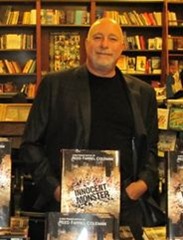
Reed Farrel Coleman has been called a hard-boiled poet by NPR’s Maureen Corrigan and the noir poet laureate in the Huffington Press. He’s published eleven novels—two under his pen name Tony Spinosa—in three series, and the stand-alone Tower co-written with award-winning Irish author Ken Bruen. He’s won the Shamus Award for Best Novel of the Year three times, has won the Barry and Anthony, and twice been nominated for the Edgar Award. He is a co-editor of The Lineup and was the editor of the anthology Hard Boiled Brooklyn. You can reach Reed on his website, Facebook, or Twitter.
Reed is one of my favorite authors and it is quite a thrill to interview him for the blog.
Q: The sixth book in the Moe Prager series, INNOCENT MONSTER, was released October 5th. With the continued success of the series, have the expectations—of your publisher, of readers, of yourself—changed? Do you feel more pressure now to deliver a certain kind of novel? Was INNOCENT MONSTER easier or harder to write than the first five?
RFC: Oddly, I feel much less pressure than I used to. Writing Moe is like hanging out with an old friend. It’s easy and relaxed. Because I know Moe so well, I can go along for the ride. I know how he’ll react to any given situation and I know how I can make it entertaining. INNOCENT MONSTER was pretty easy to write— relatively speaking—because the basics of the plot just popped into my head once I had the title. I had a lot of fun with this one.
Q: The plots in your books are great, but what adds depth and emotional resonance throughout the series are Moe’s personal struggles. Did you map out these book-to-book-to-book character developments ahead of time?
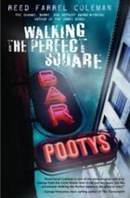 RFC: I don’t do any mapping at all, I’m thrilled to say. What makes it fun for me and, by extension, the reader, is that it’s immediate. What comes to my mind as I’m writing goes directly down on the page. It’s fresh to me, so I hope it’s just as fresh for the reader. Even when I was writing WALKING THE PERFECT SQUARE, the first book in the series, and I laid out part of the series arc, I did it because it occurred to me as I was writing it, not because it was part of some grand scheme. I think Moe’s struggles resonate, because they are resonating to me at the very moment I’m writing the words.
RFC: I don’t do any mapping at all, I’m thrilled to say. What makes it fun for me and, by extension, the reader, is that it’s immediate. What comes to my mind as I’m writing goes directly down on the page. It’s fresh to me, so I hope it’s just as fresh for the reader. Even when I was writing WALKING THE PERFECT SQUARE, the first book in the series, and I laid out part of the series arc, I did it because it occurred to me as I was writing it, not because it was part of some grand scheme. I think Moe’s struggles resonate, because they are resonating to me at the very moment I’m writing the words.
Q: I love wise-guy/angst-ridden PIs, like those written by masters of the genre Robert Crais, Robert B. Parker, Michael Connelly, and Dennis Lehane. To me, your Moe Prager books fit right in (and it’s not just my opinion, you’ve won the Shamus award three times, and been nominated for multiple Edgar and Macavity awards!). Who are some of your writing role models/influences? What living writer would you want to be stuck in an elevator with?
RFC: Last part first. I’ve been very fortunate to meet most of the people I admire in the mystery writing community. When I was the executive VP of MWA, I served with Janet Evanovich, Linda Fairstein, Lisa Scottoline, Charlaine Harris ... I’ve met Nelson DeMille and Stephen King. I’ve done signings with Michael Connelly. I’ve had some interesting conversations with Lee Child. I’ve written a book with Ken Bruen. They’re all pretty fascinating people, but if I were stuck on an elevator, I think I’d like to be stuck there with SJ Rozan, Daniel Woodrell, Philip Kerr, and Peter Spiegelman. As far as influences on my writing, I’d say Chandler and Hammett, of course, but the biggest influence on the Moe books was Lawrence Block, hands down.
Q: You’re an adjunct professor at Hofstra University, teaching writing. If you could go back thirty years (give or take!) and have yourself as a student, what lessons would Reed the Instructor be sure Reed the Student mastered?
RFC: Harden your heart against the hardships because there’s nothing you can do to prevent them, and keep doing what you’re doing.
Q: You co-wrote the critically-acclaimed novel TOWER with Ken Bruen. Could you describe the process? Was it easier or harder than writing solo? In what ways?
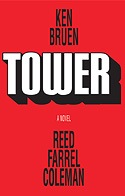 RFC: The process was like water-boarding, only worse. Not that I don’t love Ken. I do. It’s just that he did this Zen thing with me. He sent me half the book and then left it up to me to figure out how to do my half and make it work. We never discussed how to do it. It was like I had to find my way to be the other hand in the one hand clapping metaphor. It nearly killed me, but it made me such a better writer because it was so hard. Much much harder than writing solo.
RFC: The process was like water-boarding, only worse. Not that I don’t love Ken. I do. It’s just that he did this Zen thing with me. He sent me half the book and then left it up to me to figure out how to do my half and make it work. We never discussed how to do it. It was like I had to find my way to be the other hand in the one hand clapping metaphor. It nearly killed me, but it made me such a better writer because it was so hard. Much much harder than writing solo.
Q: A few years ago, you served as the Executive Vice President of Mystery Writers of America (MWA). You also teach, appear at conferences, and promote your new releases. What’s your secret for balancing writing with all these other commitments?
RFC: Drugs.
Q: You’ve written both novels and short stories. Preference? Aside from the number of words, what’s the biggest difference between the two forms?
RFC: When I teach I describe the difference this way: A short story is like a road flare. It has to burn brightly and be intensely about one thing. A novel is like night sky, full of stars, some shining more brightly than others. Or, if you prefer, it’s like the difference between red and white wines. Red wines tend to be more complex and, depending upon grape variety and vintage, can change as they age. White wines are less complex and tend to be about one thing. Short stories and novels are different beasts and require different talents. Lately, I’ve been pretty enamored of short stories. 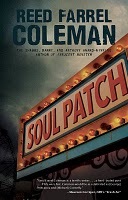
Q: Which of your books is your favorite? Why?
RFC: REDEMPTION STREET and SOUL PATCH are tied. They both hit very close to home emotionally.
Q: What can we expect in the future? More Moe Prager? More Tony Spinosa-penned stories? Another stand-alone collaboration? A series about a wise-cracking, follicle-challenged guy from Brooklyn who likes to play basketball and is a hell of a writer?
RFC: I’m writing a new Moe book right now called HURT MACHINE. I don’t think there will be any new Tony Spinosa books, though there might be the occasional story out of him. I want to do a few more collaborations because TOWER was such a challenge and made me a better writer. A stand-alone of mine is being shopped now. I guess we’ll see.
Thanks, Reed, and best of luck with INNOCENT MONSTER.
 by Julia Buckley
by Julia Buckley









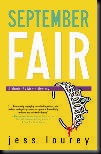

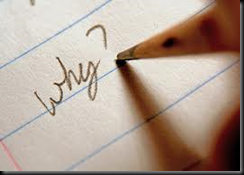




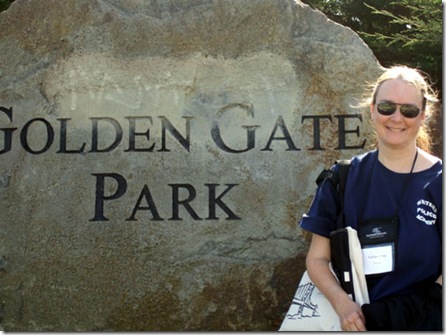
 Bouchercon 2010 was in San Francisco, 32 miles north of where I live in Palo Alto. The tariff for parking was $60 on a weekday, so I hopped a train on Thursday, October 14. I meant to go to panels that morning, but somehow I kept getting waylaid.
Bouchercon 2010 was in San Francisco, 32 miles north of where I live in Palo Alto. The tariff for parking was $60 on a weekday, so I hopped a train on Thursday, October 14. I meant to go to panels that morning, but somehow I kept getting waylaid.  Thursday afternoon I showed up at my assigned panel, "The Most Deadly Species: Female Protagonists." The room was chock-full.
Thursday afternoon I showed up at my assigned panel, "The Most Deadly Species: Female Protagonists." The room was chock-full.  They sure as heck weren't there for me. Cornelia Read moderated. Can you see her down there at the far end? Tasha Alexander, Ronald Tierney, Larry Light, Meredith Anthony, and I were the ones responsible for answering her probing questions. When I told my agent I was on this panel, he asked why. I pointed out that my Smasher had a female protagonist. He said it didn't count since she spent over half the book in a coma. Good point, Josh. Anyway, I put in a plug for the 1930s Nancy Drew as a great prototype for female protagonists. She packed a rod and sure as hell did not wait for Ned Nickerson to save her.
They sure as heck weren't there for me. Cornelia Read moderated. Can you see her down there at the far end? Tasha Alexander, Ronald Tierney, Larry Light, Meredith Anthony, and I were the ones responsible for answering her probing questions. When I told my agent I was on this panel, he asked why. I pointed out that my Smasher had a female protagonist. He said it didn't count since she spent over half the book in a coma. Good point, Josh. Anyway, I put in a plug for the 1930s Nancy Drew as a great prototype for female protagonists. She packed a rod and sure as hell did not wait for Ned Nickerson to save her. Here's a photo from Thursday night's welcome reception that includes three glamorous crime fiction award winners and some balding joker. (From left, that's G.M. Malliet, Baldy, Hank Phillippi Ryan, and Lee Child.)
Here's a photo from Thursday night's welcome reception that includes three glamorous crime fiction award winners and some balding joker. (From left, that's G.M. Malliet, Baldy, Hank Phillippi Ryan, and Lee Child.) I went to Friday's panel on ancient Greek and Roman mysteries to meet Lindsey Davis. I came up with the name of my Child #2, now 18, when reading The Silver Pig, first in her Marcus Didio Falco series. I didn't ever get the chance to say hello, but hey, Lindsey, thanks!
I went to Friday's panel on ancient Greek and Roman mysteries to meet Lindsey Davis. I came up with the name of my Child #2, now 18, when reading The Silver Pig, first in her Marcus Didio Falco series. I didn't ever get the chance to say hello, but hey, Lindsey, thanks!  I love the people who love to read crime fiction. Mary Jane Sheffel stopped me to tell me how much she loved my books. So shocked to hear this were fellow scribes Sharon Rowse (far left) and Shane Gericke (far right) that they joined Mary Jane and me in a photo.
I love the people who love to read crime fiction. Mary Jane Sheffel stopped me to tell me how much she loved my books. So shocked to hear this were fellow scribes Sharon Rowse (far left) and Shane Gericke (far right) that they joined Mary Jane and me in a photo. 
 After dinner, we joined the raucous crowd at Lee Child's party for all Bouchercon attendees. (Lee is one generous guy.) That's IPPY winner and fellow Silicon Valley denizen Mark Coggins on the right with New York super-agents Josh Getzler and Donna Bagdasarian.
After dinner, we joined the raucous crowd at Lee Child's party for all Bouchercon attendees. (Lee is one generous guy.) That's IPPY winner and fellow Silicon Valley denizen Mark Coggins on the right with New York super-agents Josh Getzler and Donna Bagdasarian.  I wanted to see the panel on East Coast versus West Coast mystery writing, which quickly turned into a comparison of New York City and Los Angeles as settings from crime fiction. In the photo above, flanking one of my mystery-writing idols, Walter Mosley, are old pal Naomi Hirahara on the left and S.J. Rozan on the right. During the question period, I asked the panelists how show business in LA and the financial business of New York City influenced their books. I managed to get into a little verbal sniping with Mr. Mosley who didn't like my question at all. Naomi helped bail me out.
I wanted to see the panel on East Coast versus West Coast mystery writing, which quickly turned into a comparison of New York City and Los Angeles as settings from crime fiction. In the photo above, flanking one of my mystery-writing idols, Walter Mosley, are old pal Naomi Hirahara on the left and S.J. Rozan on the right. During the question period, I asked the panelists how show business in LA and the financial business of New York City influenced their books. I managed to get into a little verbal sniping with Mr. Mosley who didn't like my question at all. Naomi helped bail me out.











 How did he get that gig? He was chosen by the directors of the
How did he get that gig? He was chosen by the directors of the 




